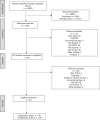Psychological distress in the neonatal intensive care unit: a meta-review
- PMID: 39327462
- PMCID: PMC11624136
- DOI: 10.1038/s41390-024-03599-1
Psychological distress in the neonatal intensive care unit: a meta-review
Abstract
Introduction: Parental psychological distress (PD) (anxiety, depression, stress and post-traumatic stress syndrome) can adversely affect parents' own physical and mental health as well as their children's long-term health and development. Numerous studies have addressed PD in mothers of infants admitted to NICU, with interventions proposed, but few have addressed the impact on fathers or other family members. The present review examined systematic reviews that addressed PD in NICU and potential interventions.
Methods: A meta-review was performed by searching various databases between 2000 and May 2024.
Results: Fifty-four studies were included. The incidence of maternal PD varied depending on the screening tool used (13-93%), as did paternal PD (0.08-46%). The incidence of PD in sexual, racial and gender minorities, siblings, grandparents and those in lower-middle income countries is not known. Numerous screening tools were used with a wide variety of cut-off values. Various intervention programmes were evaluated and showed contradictory evidence regarding their effect on PD.
Discussion: Routine screening should be implemented together with a combination of interventional programmes, specifically family-centred interventions. More research is required for PD in siblings, sexual and gender minority parents as well as parents living in low middle income countries.
Impact statement: Psychological distress is high in NICU, affecting parents and siblings. Maternal psychological distress may have long lasting effects on infant health and differs from that of fathers, who require as much attention as mothers Little is known about emotional stress in siblings and sex and gender minority group peoples Few interventions showed conclusive effectiveness in reducing psychological distress with combination interventions showing more effectiveness than single interventions.
© 2024. The Author(s).
Conflict of interest statement
Competing interests: The authors declare no competing interests.
Figures
Similar articles
-
Impact of psychological distress and psychophysical wellbeing on posttraumatic symptoms in parents of preterm infants after NICU discharge.Ital J Pediatr. 2022 Jan 24;48(1):13. doi: 10.1186/s13052-022-01202-z. Ital J Pediatr. 2022. PMID: 35073953 Free PMC article.
-
Parent psychological wellbeing in a single-family room versus an open bay neonatal intensive care unit.PLoS One. 2019 Nov 5;14(11):e0224488. doi: 10.1371/journal.pone.0224488. eCollection 2019. PLoS One. 2019. PMID: 31689307 Free PMC article.
-
Parental stress, depression, anxiety and participation in care in neonatal intensive care unit: a cross-sectional study in Italy comparing mothers versus fathers.BMJ Paediatr Open. 2024 Apr 8;8(Suppl 2):e002429. doi: 10.1136/bmjpo-2023-002429. BMJ Paediatr Open. 2024. PMID: 38589039 Free PMC article.
-
A multilayered approach is needed in the NICU to support parents after the preterm birth of their infant.Early Hum Dev. 2019 Dec;139:104838. doi: 10.1016/j.earlhumdev.2019.104838. Epub 2019 Aug 27. Early Hum Dev. 2019. PMID: 31471000 Review.
-
Screening parents of high-risk infants for emotional distress: rationale and recommendations.J Perinatol. 2013 Oct;33(10):748-53. doi: 10.1038/jp.2013.72. Epub 2013 Jun 27. J Perinatol. 2013. PMID: 23807720 Review.
Cited by
-
Family integrated care reduces stress in transferred parents of preterm infants, but not across all families: a stepped-wedge cluster-randomized trial.J Perinatol. 2025 Jun;45(6):797-805. doi: 10.1038/s41372-025-02318-w. Epub 2025 May 20. J Perinatol. 2025. PMID: 40394238 Clinical Trial.
-
A Protocol for the Development and Validation of the Postpartum Specific Anxiety Scale-Preterm Birth [PSAS-PTB] and the Postpartum Specific Anxiety Scale-Neonatal Intensive Care Unit [PSAS-NICU].Int J Methods Psychiatr Res. 2025 Sep;34(3):e70032. doi: 10.1002/mpr.70032. Int J Methods Psychiatr Res. 2025. PMID: 40782330 Free PMC article.
-
The effect of peer-led education on the quality of life of mothers of premature infants in neonatal intensive care units: a quasi-experimental study.BMC Res Notes. 2025 Jul 26;18(1):327. doi: 10.1186/s13104-025-07403-z. BMC Res Notes. 2025. PMID: 40713902 Free PMC article.
References
-
- Roque, A. T. F., Lasiuk, G. C., Radunz, V. & Hegadoren, K. Scoping review of the mental health of parents of infants in the NICU. J. Obstet. Gynecol. Neonatal Nurs.46, 576–587 (2017). - PubMed
-
- Adama, E. A., Adua, E., Bayes, S. & Morelius, E. Support needs of parents in neonatal intensive care unit: an integrative review. J. Clin. Nurs.31, 532–547 (2022). - PubMed
-
- Vazquez, V. & Cong, X. Parenting the NICU infant: a meta-ethnographic synthesis. Int. J. Nurs. Sci.1, 281–290 (2014).
Publication types
MeSH terms
LinkOut - more resources
Full Text Sources


